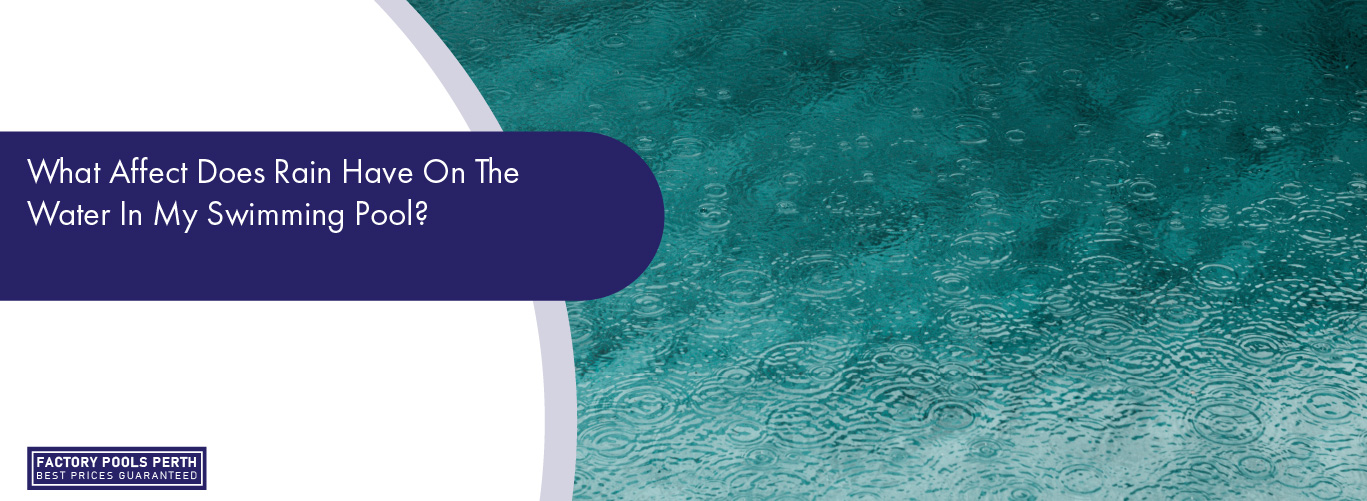What Effect Does Rain Have On The Water In My Swimming Pool?
Owning a pool comes with its responsibilities. You should be mindful of the health of the people entering the pool. A swimming pool requires constant care, and you need to follow a carefully drafted maintenance schedule for a healthy pool. Regular maintenance can ensure that the water in a pool remains hygienic. However, there are too many variables that are not under human control. You can not prepare for such elements. What you can do instead is respond appropriately. For this, you need to prepare yourself in advance.

While most of the pool owners take into consideration things like a snow or dust storm, they forget that even a simple shower can affect the pool water significantly. In fact, rainwater affects the water in your swimming pool in more ways than you can possibly imagine. But, the effect of rain on your pool need not always be harmful. It can be good, bad, or both. Whether you have owned a pool for years or you are planning to get one soon, this article will help you understand the effects that rainwater can have on your swimming pool.
Overview
The most important thing in your pool is the quality of water. Rainwater often alters the chemistry of pool water. Not only does it have acidic nature, but it also contains other chemicals. It can affect several crucial factors like the pH of the pool water, the levels of chlorine, the alkalinity, and more. Acid rain, quite a common phenomenon these days thanks to all the air pollution from the industries, has a detrimental effect on the pool water. Acid rain is a phenomenon that occurs when the rainwater mixes with harmful industrial gases like oxides of sulfur and nitrogen. This mixing of rainwater and toxic gases results in the preparation of chemicals like nitric and sulfuric acid, which are harmful. It messes up the pH levels of the pool and can cause skin and eye-related problems.
Apart from acid rain directly falling into your pool and messing with its chemistry, there are other ways in which your pool water becomes unhygienic. The rainwater falling on other surfaces like roofs, decks, or ground and then running into your pool can also change the chemistry of pool water. This run-off water carries with it both chemical debris and sediments. It can contain anything from hardness-causing agents like calcium and salts to other total dissolved solids or TDS. It contaminates the pool water, making it more alkaline or acidic than usual. It can lead to corrosion of metallic parts or even the walls of the pool.
The chemical imbalance in the pool can also increase the algae growth inside the pool, which will cost you extra effort to clean it.
Although most of these chemical imbalances depend upon the quantity of rainfall and the local climate of the place, you should still be careful. You need to ensure that the chemistry of your pool water is balanced all the time. Let us have a look at how the rainwater affects the swimming pool more closely.

Rainfall and Water Chemistry
Let us have a look at how the rainwater affects the chemistry of the swimming pool more closely.
It goes without saying that the chemistry of pool water is crucial. Balanced chemical concentration means pool water is suitable not only for the people entering the pool but also for the equipment in the pool. We have already established that the rain can be acidic and can alter the pH of pool water. Generally, the pH of the pool should be anywhere between 7.4 to 7.6. The rainwater, in the case of acid rain, can have a pH as low as 5.0. This means a heavy rainfall can significantly lower the pH levels of pool water.
Another problem caused by rainwater is that it can affect the levels of chlorine in the water. We know an adequate level of chlorine is crucial for a hygienic and safe pool. The principle is the same, heavy rain affects the level of chlorine more. It can dilute the chlorine in the pool.
Note that only a heavy shower can alter the pH or chlorine level of the pool significantly. So you need not worry too much about an odd passing shower. However, even light rain can cause other problems like algae spores in and around your pool.
Should I raise the pH level after every shower?
As mentioned above, a light shower does not affect the pH of the pool too much. However, a lot depends on the current chemistry of your pool. If the pH level of your is properly maintained and you check the alkalinity of the water regularly, a light shower is nothing to worry about.
If there is a heavy shower or a light one lasting for a longer duration, you will have to check the pH of pool water and act accordingly. The same also goes for the level of chlorine in the water.
Physical debris
The runoff water that goes into the pool brings with it a lot of insoluble waste that can be extremely difficult to clean. It involves everything from sediments to leaves to plastic waste. This solid waste can block water filters if you have them and lead to a bigger issue.

Excess Water
This is another big problem caused due to heavy rain. Accumulation of excess water in and around the pool. It might seem like an insignificant problem, but it can lead to several issues. Depending on the region you live in, heavy rainfall has the potential of flooding the area. If you already have a large water body, like a pool in the backyard, the chances of flooding will increase and so will the damage caused due to it. The extra debris and runoff can damage essential equipment in and around the pool. Cleaning after the rain and removing all the debris from the pool is another task.
Are there benefits to rain in the pool?
The answer is yes, rain can affect your pool positively too. The level chemicals in your pool need to be in check. At times, the concentration of these chemicals becomes too high. You can turn to agents that balance out these chemicals known as stabilizers. But, these stabilizers also work to a certain extent and after some time, the only most effective option to tackle this problem is diluting the pool water. Rain can help you with this without you putting in any extra effort.
However, the main downside to this is that you can not control the amount of rainfall. Another major issue is that you can not choose which chemicals the rain will dilute. It affects the overall chemistry of the pool.
Conclusion
There is much more to the maintenance of a swimming pool than we can imagine. Looking out for the chemical changes, insoluble debris, and making it safe to use are just a few key components of a continuous process. Keeping the chemical levels of your pool in check is your best chance to keep everyone entering the pool healthy. It also prevents harm to the walls and equipment of the pool.

